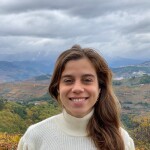Class 2018
PhD Grant: PD/BD/142945/2018
PhD thesis
Exploring yeast-yeast interactions to foster stylistic wine production: a FLAVOROMICS-based approach
Supervisors
• Nuno Gonçalo Pereira Mira, Professor @ IST/ULisboa, PT
• Ana Alexandra Mendes-Ferreira, Professor @ Universidade de Trás-os-Montes e Alto Douro, Vila Real, PT
Collaborations
Proposal summary
Although ancient, winemaking still remains a challenging bioprocess specially considering the pressing need for the development of products with distinct properties that can be competitive in a highly demanding market. Yeasts play a pivotal role in vinification process, not only Saccharomyces cerevisiae, which is the species that leads the conversion of sugar into ethanol, but also endogenous Yeasts (generally known as non-Saccharomyces) that are to part endogenous to the musts microbiota and whose role in obtaining wines with stylistic aromatic properties is being increasingly acknowledged. However, the use of these Non-Saccharomyces species is still very much limited by the very poor knowledge that is available concerning their biology, physiology and genetics. The present PhD program intends to fulfill that gap in knowledge by exploring a set of genomic approaches to further study relevant Non-Saccharomyces species in the context of wine making, with emphasis on those belonging to the Saccharomycodeacea family. Focus is also put on studying, at a more molecular level, how these Non-Saccharomyces species can interact with S. cerevisiae to modulate primary, secondary and tertiary wine aroma. Understanding these microscopic and intricate processes, which involve interplay of multiple metabolic pathways, is crucial to shape and style wine to achieve specific and distinguishable aromatic profiles.
PUBLICATIONS
Papers
Tavares, M.J., Güldener, U., Mendes-Ferreira, A. et al. Genome sequencing, annotation and exploration of the SO2-tolerant non-conventional yeast Saccharomycodes ludwigii. BMC Genomics 22, 131 (2021). https://doi.org/10.1186/s12864-021-07438-z
Esteves, M., Barbosa, C., Vasconcelos, I., Tavares, M.J., Mendes-Faia, A., Mira, N.P., Mendes-Ferreira, A., Characterizing the potential of the Non-Convetional Yeast Saccharomycodes ludwigii UTAD17 in Winemaking. Microorganisms 7 (11), 478, 2019.
Tavares, M.J., Güldener, U., Esteves, M., Mendes-Faia, A., Mendes-Ferreira, A., Mira, N.P. Genome Sequence of the Wine Yeast Saccharomycodes ludwigii UTAD17. Microbiology Resource Announcements 7, 18, 2018.
Oral Communications
Tavares, M.J, Güldener, U., Tenreiro, R., Mendes-Faia, A., Mendes-Ferreira, A., Mira, N.P. “Unveiling the biology and physiology of the wine yeast Saccharomycodes ludwigii UTAD17 through the exploration of genomics data.” 7th Conference on Physiology of Yeasts and Filamentous Fungi. 24th-27th June 2019, Milan, Italy. (Flash Presentation)
Tavares, M.J, Güldener, U., Tenreiro, R., Mendes-Faia, A., Mendes-Ferreira, A., Mira, N.P. “Fostering the utilization of the Non-Saccharomyces yeast Saccharomycodes ludwigii UTAD17 as a co-adjuvant of fermented beverages through the exploration of comparative genomics data.” International Congress on Grapevine and Wine Science. 7th-9th November 2018 Logroño, Spain.
Poster Communications
Tavares, M.J, Güldener, U., Tenreiro, R., Mendes-Faia, A., Mendes-Ferreira, A., Mira, N.P. “Fostering the utilization of the Non-Saccharomyces yeast Saccharomycodes ludwigii UTAD17 as a co-adjuvant of fermented beverages through the exploration of comparative genomics data.” XXI Jornadas de Leveduras Professor Nicolau van Uden. 8th-9th June 2018, Braga, Portugal.
Tavares, M.J, Güldener, U., Tenreiro, R., Mendes-Faia, A., Mendes-Ferreira, A., Mira, N.P. “Unveiling the biology and physiology of the wine yeast Saccharomycodes ludwigii UTAD17 through the exploration of genomics data.” 7th Conference on Physiology of Yeasts and Filamentous Fungi. 24th-27th June 2019, Milan, Italy.
DOCTORAL PROGRAM (36 ECTS)
Curricular units:
• Bioentrepreneurship (6 ECTS)
• Outreach and Teaching Skills (6 ECTS)
• Microbiomes and Metagenomics (6 ECTS)
• Molecular and Cell Biophysics (6 ECTS)
• General Doctoral Training (6 ECTS)
• Advanced Experimental Techniques and methodologies (6 ECTS)
Advanced Courses
• Teaching STEM Students – Transformation Guide for teaching Assistants 1st Ed., by Academic Development Office, 10-12 September 2018, Instituto Superior Técnico, Lisbon, Portugal